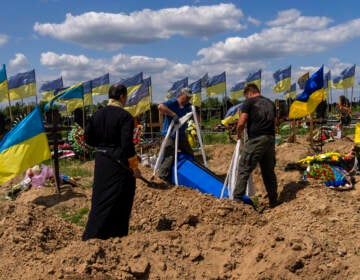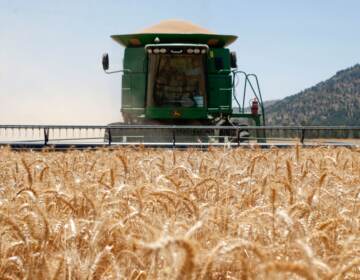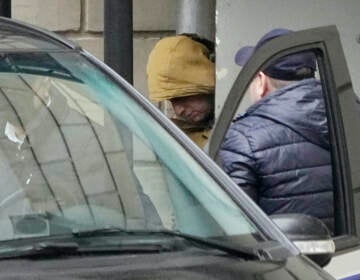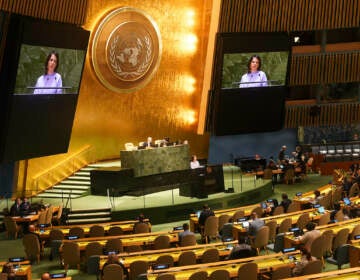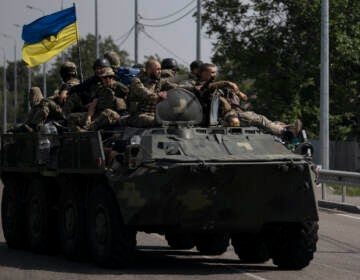‘Relentless’: Russia squeezes Ukrainian strongholds in east
Ukraine’s foreign minister warned that without a new injection of foreign weapons, Ukrainian forces would not be able to stop Russia's advance in the Donbas.
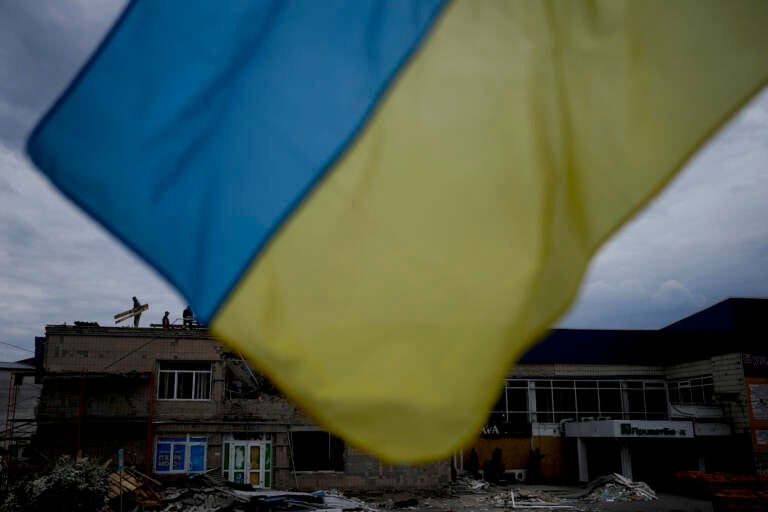
Men work at repairing a building damaged by shelling in Makariv, on the outskirts of Kyiv, Ukraine, Friday, May 27, 2022. (AP Photo/Natacha Pisarenko)
Russia-backed separatists claimed they captured a railway hub city in eastern Ukraine as Moscow’s forces pushed to gain more ground Friday by pounding another Ukrainian-held area where authorities say 1,500 people have died since the start of the war.
With Russia’s offensive in Ukraine’s industrial Donbas region showing incremental progress, Ukrainian officials characterized the battle there in grave terms and renewed their appeals for more sophisticated Western-supplied weaponry. Without that, Ukraine’s foreign minister warned, Ukrainian forces won’t be able to stop Russia’s advance on the east.
Some European leaders sought dialogue with Russian President Vladimir Putin toward ending a war in its 93rd day that has ravaged both Europe and Russia’s economies, while Britain’s foreign minister worked to rally the West’s continued support for Ukraine.
“There should be no talk of ceasefires, or appeasing Putin. We need to make sure that Ukraine wins. And that Russia withdraws and that we never see this type of Russian aggression again,” U.K. Foreign Secretary Liz Truss said.
But in Ukraine’s east, Russia has the upper hand. The fighting Friday focused on two key cities: Sievierodonetsk and nearby Lysychansk. They are the last areas under Ukrainian control in Luhansk, one of two provinces that make up the Donbas and where Moscow-backed separatists have controlled some territory for eight years.
“There are battles on the outskirts of the city. Massive artillery shelling does not stop, day and night,” Sievierodonetsk Mayor Oleksandr Striuk told The Associated Press. “The city is being systematically destroyed – 90% of the buildings in the city are damaged.”
An assault was underway in the city’s northeastern quarter, where Russian reconnaissance and sabotage groups tried to capture the Mir Hotel and the area around it Friday, Striuk said.
At least 1,500 people have died in Sievierodonetsk because of the war since Russia invaded Ukraine on Feb. 24, he said.
The figure includes people killed by shelling or in fires caused by Russian missile strikes, as well as those who died from shrapnel wounds, untreated diseases, a lack of medicine or while trapped under rubble, according to the mayor.
About 12,000 to 13,000 people remain in the city – down from a pre-war population of about 100,000, he said. Those remaining are huddled in shelters, and largely cut off from the rest of Ukraine.
In Donetsk, the Donbas region’s other province, the Russia-backed rebels said Friday they took control of Lyman, a large railway hub north of two more key cities that remain under Ukrainian control.
Ukrainian presidential adviser Oleksiy Arestovich acknowledged that “we lost Lyman” Thursday night. However, a Ukrainian Defense Ministry spokesperson reported Friday that its soldiers countered Russian attempts to push them completely out of the city.
Ukrainian analysts said Russian forces have taken advantage of delays in Western arms shipments to step up their offensive in the east and secure territory before Ukraine’s fighters could push them back.
Russia brought in an additional 10-12 battalion tactical groups to the zone, military analyst Oleh Zhdanov said.
Throwing so much muscle at the offensive could also backfire by seriously depleting Russia’s arsenal. Echoing an assessment from the British Defense Ministry, Zhdanov said Russia was deploying 50-year-old T-62 tanks, “which means that the second army of the world has run out of modernized equipment.”
Mykola Sunhurovskyi, an analyst at Kyiv’s Razumkov Center, said that going forward, “It is in Putin’s interests to solidify the situation that has developed today at the front, biting off from Ukraine what there is still strength for, and secure this line of contact as a position in (eventual) negotiations.”
As Ukraine’s hopes of stopping the Russian advance faded, Ukrainian Foreign Minister Dmytro Kuleba pleaded with Western nations: “We need heavy weapons. The only position where Russia is better than us, it’s the amount of heavy weapons they have. Without artillery, without multiple launch rocket systems, we won’t be able to push them back.”
In his nightly address to the nation, Ukrainian President Volodymyr Zelenskyy had some harsh words for the European Union, which has not agreed on a sixth round of sanctions that includes an embargo on Russian oil. With Hungary blocking the deal, EU countries are hunting for other methods to punish Russia.
“Pressure on Russia is literally a matter of saving lives,” Zelenskyy said. “And every day of delay, weakness, various disputes or proposals to ‘appease’ the aggressor at the expense of the victim is new killed Ukrainians. And new threats to everyone on our continent.”
Zelenskyy said Russia’s offensive in the Donbas could leave its communities in ashes and uninhabitable. He accused Moscow of pursuing “an obvious policy of genocide” through mass deportations and killings of civilians.
On Thursday, Russian shelling of Kharkiv, a northeastern city that has been under assault while Ukrainian forces keep the invading troops out, killed nine people, including a father and his 5-month-old baby, the president said.
Associated Press reporters saw the bodies of at least two dead men and four wounded at a central subway station, where the victims were taken as shelling continued outside.
To the north, neighboring Belarus announced Friday that it was sending troops toward the Ukrainian border, raising concerns in Ukraine’s military command. Russia used Belarus as a staging ground before it invaded Ukraine.
Germany’s development minister traveled to Ukraine on Friday to pledge further civilian support and to discuss the country’s rebuilding. Austria’s chancellor, meanwhile, was set to talk to Russian President Vladimir Putin about possible prisoner exchanges.
Italian Premier Mario Draghi talked with Putin on Thursday but reported no breakthrough. “If you are asking me if there are openings for peace, the answer is no,” Draghi told reporters.
Putin and Draghi’s conversation focused on the question of unblocking Ukrainian ports to allow grain to be delivered to countries that are suffering a food crisis, and avoid the risk that the stores rot in port.
Moscow pressed the West on Thursday to lift sanctions already imposed over the war, seeking to shift the blame for a growing global food crisis that has been worsened by Kyiv’s inability to ship millions of tons of grain and other agricultural products while under attack.
WHYY is your source for fact-based, in-depth journalism and information. As a nonprofit organization, we rely on financial support from readers like you. Please give today.


